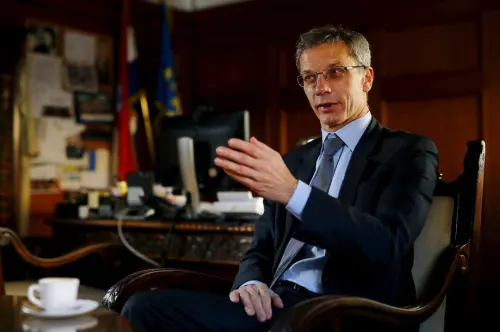Introduction
The European Central Bank (ECB) should remain cautious in its response to recent declines in euro-zone inflation, according to ECB policymaker Boris Vujcic. He expressed confidence that inflation rates are likely to increase again, despite current figures.Context
On Thursday, the ECB implemented its eighth rate hike in a year but indicated that it may pause future adjustments next month, given its inflation projection of just 1.6% for next year. As of May, inflation in the 20 euro-using countries was reported at 1.9%.Developments
Vujcic, who also serves as Croatia's central bank governor, advised against "precision surgery" in monetary policy. He stated that slight fluctuations around the target are typical and should not invoke an overreaction. He highlighted that small deviations of several basis points from the 2% target are not problematic, emphasizing the need to maintain a balanced view.He noted that inflation is expected to rise again, driven by stabilizing energy prices and economic growth, while the strength of the euro is not likely to have immediate adverse effects unless sustained over several quarters.
Concerns have been raised by some ECB officials, including Portugal's central bank governor Mario Centeno, about the potential risks of euro-zone inflation pressures. However, Vujcic views the risks as relatively balanced, although he acknowledged uncertainties relating to global trade tensions influenced by U.S. policy.
Vujcic reflected on advice he received from former Federal Reserve Chair Alan Greenspan, suggesting that a high rate of inflation poses a greater risk than a low one. He argued that historical periods of low inflation, driven by productivity growth, did not raise concerns at the time, calling into question the need for aggressive intervention in the current economy.
The ECB is currently evaluating its long-term strategies, particularly the effectiveness of extensive bond purchases and quantitative easing (QE) in combating low inflation. Over the past decade, the ECB has injected approximately 7 trillion euros into the banking system through QE and other measures, contributing to real estate market bubbles and potential losses for the bank.
Vujcic posits that, while QE can stabilize markets during crises—as seen in 2008 and during the COVID-19 pandemic—its effectiveness may diminish if deployed excessively to elevate inflation. This sentiment resonates among some ECB policymakers leaning toward a hawkish stance, and discussions regarding the ECB's revised strategy are soon to be unveiled.
